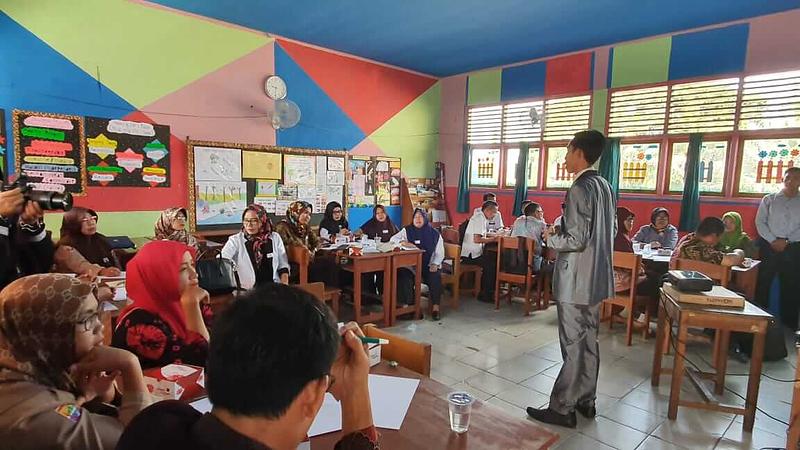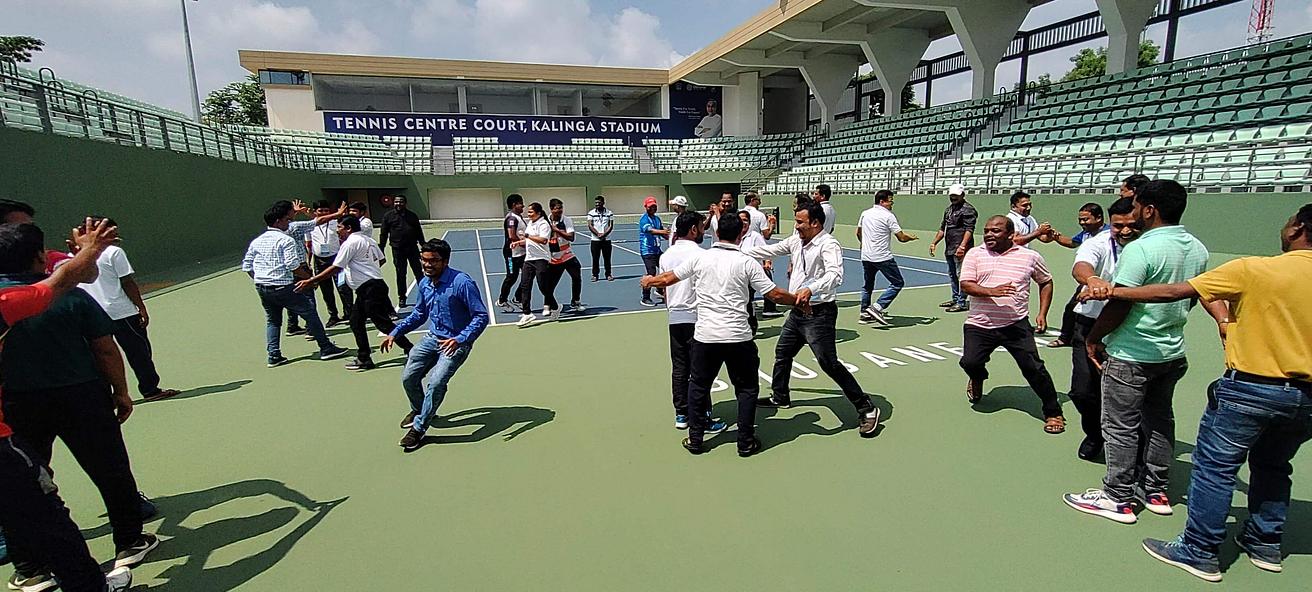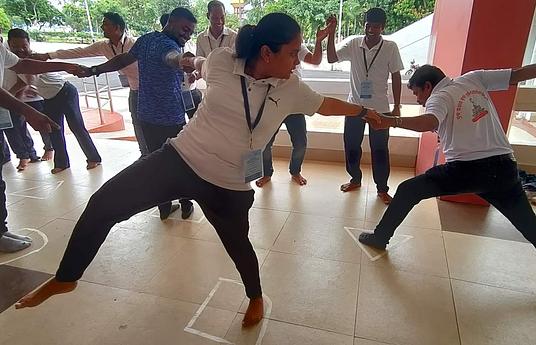“Professional development is not something given to you by someone. You can actively engage in professional readings, a spontaneous experiment or a personal action research in teaching and learning. Then you will encounter like-minded educators along the way. It is about autonomy, mastery and purpose that will lead you from good to great,” explains Noburo Hagiwara, HundrED Community Lead and Head of School at Senri International School, has dedicated much of his professional career to helping teachers develop their skills.
His insights help explain why effective teacher professional development (PD) is such a difficult challenge. Nevertheless, effective continuing education through PD is key to helping teachers help their students succeed.
That mission is what drives that make up the 2024 HundrED Global Collection: Being a Proactive Teacher in Formative Assessment, Teachease, Magic Bus India, ABCDE of Learner Needs, Teacher Learning Center (TLC).

Teachease helps experienced teachers discover new subjects alongside their students.
Formative assessment, first developed in Britain, has been shown to improve student outcomes, classroom engagement, and teacher wellbeing. But it represents a drastic change in how teachers approach their classrooms and lessons.
For those who were trained in a more traditional method, significant PD is required. As Kazakh teachers at Nazarbayev Intellectual Schools looked into formative assessment, it quickly became apparent that an infrastructure would need to be built out to support its widespread adoption in their schools.
Kazakh teachers enjoy low workplace stress, high regard in society, and the highest rate of teacher PD participation among OECD countries, including in PD run by teachers, for teachers. Leveraging the collegiality in their communities, they developed their innovation, Being a Proactive Teacher in Formative Assessment, to help groups of teachers take a long-term approach to the starting to use formative assessment in their classrooms.
Trusting teachers to teach each other is a hallmark of most effective PD programmes. Another common factor in good PD is leveraging teachers’ natural curiosity. While creating Teachease, Code School Finland considered that many teachers would be interested in giving their students coding skills without having experience in it themselves. And they soon realized that it could be a benefit.
A teacher new to coding “is far better able to sympathise with a novice and address their specific challenges and psychological barriers. They have a fresher perspective…. To a coding professional, a lot seems self-evident and not worthy of attention,” says CSF’s Kaisu Pallaskallio. Teachease works as a Trojan horse of sorts by using digital skills as a way to introduce - or reinforce - modern pedagogies like project based learning.
"Until now, many teachers used fear or power to control the students. The training sessions are eye-openers."
Magic Bus India also trusted teachers to help Indian schools integrate more playful and joyful teaching, known as ludic pedagogy. Ludic learning “makes learning more fun, application-based and therefor more experiential compared to rote learning,” says Dhanashri Brahme. “It also helps to break down the fear of learning, of schools, of teachers. It builds a more participatory environment that is conducive to learning.” They integrate life skills education into playful experiences, which ultimately lead to broad improvements in student outcomes. Their most effective domain is Physical Education classes, whose teachers are traditionally undervalued in schools.
How do they do it? They train the trainers.
Dhanashri says one reason is “scale, the sheer number of teachers to be reached. Second and more important, though, is the need to build capacities within the system to continue similar training programmes.” By enabling teachers to do what they do best, Magic Bus has built an infrastructure that has impacted more than 2 million students throughout the country. Teachers are changed too. “Until now, many teachers used fear or power to control the students. The training sessions are eye-openers. Teachers became more sensitive towards child safety and protection and many expressed that their perceptions on issues such as child abuse, child rights and gender equity had changed. As one teacher told us, ‘Other teachers need a stick. All we need is a whistle and the kids come to us.’”
Magic Bus India makes school more playful for students and teachers
Some PD is more broad based. Center for Inspired Teaching, a nonprofit working to shift education from compliance to engagement through improvisation-based PD for teachers, centers its innovation, the ABCDE of Learner Needs, outlines what considerations need to be made when planning lessons for any age. By breaking down the basics of creating engaging, purposeful lessons into attainable steps, the programme makes space for something sorely missing in much of education: Joy. Some 90 percent of participants report that the ABCDEs have brought them closer to their students, and schools that have adopted the work report a more resilient, convivial community amongst teachers. Importantly, this work is adaptive.
“We’ve implemented this transformational framework with educators in large American cities, small rural districts, and countries in the midst of conflict and war. ABCDE of Learner Needs resources are digital, making them available to any educator anywhere with an internet connection and a desire to understand and support their students,” says Inspired Teaching’s Aleta Margolis. In cooperation with Osvitoria, they have created a Ukrainian-language version of the framework that has enabled thousands of teachers to provide quality, responsive education to students in the midst of unprecedented upheaval. Teachers say that the tools have helped them understand not only what their students need to succeed, but what their own experiences are as well.
It's about autonomy, mastery and purpose that will lead you from good to great
Tailoring experiences is hugely important as well. Indonesia’s Ministry of Education undertook broad-based teacher reforms in 2019 targeting more student-centered approaches to teaching. But the physical and social topographies of the island nation have made it difficult for these new pedagogies to take root.
"There are over 4 million teachers in Indonesia, reflecting a rich array of experiences, cultures, regions, and learning needs, several of which are marginalized in the mainstream culture", says Juliana of Putera Sampoerna Foundation.
"Teachers still find it difficult to be autonomous learners despite the resources available for them. Other emerging challenges include urban-rural disparities in which tailoring professional development to diverse needs is a complex task and disparities in technology access and digital literacy skills that can impede the effective integration of technology into teaching practices.”

Teacher Learning Centers adapt to the needs of the teachers they serve.
In response to these challenges they developed a structure for helping develop best practices responsively, called the Teacher Learning Center (TLC). Juliana says that they carefully assess teacher needs and competencies to best help teachers develop sustainably. The TLCs entail specially trained Master Teachers that understand their peers' learning needs and serve to facilitate subject learning, TLC coordinators who can work within local cultures to ensure smooth operation of the Center, and strong commitments from local governments to support, endorse, and monitor the effectiveness of the TLC through its implementation. What happens in each TLC is different, though, as they are designed to build teaching capacity within the local community.
What these programmes show us is clear: effective teacher professional development isn’t one-size-fits-all. It requires trust in teachers’ expertise, a focus on building long-term capacity, and an understanding of the specific needs of each learning community. These HundrED innovations offer a glimpse into the future of PD - one where teachers don’t passively receive training but actively shape their own practice and the experiences of their students.
Working on something impactful in education? We want to hear from you!
Submit your innovation to the Global Collection

.png)
